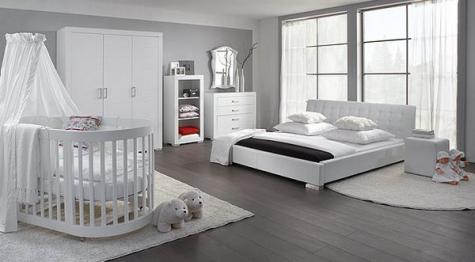Bed sharing, or co-sleeping, increases the risk of sudden infant death syndrome (SIDS) according to a study published in the British Medical Journal.
The study Bed sharing when parents do not smoke: is there a risk of SIDS? An individual level analysis of five major case–control studies comes out of the UK with contributions from New Zealand and Germany. It involved comparing the cases of 1,472 SIDS cases with 4,679 healthy babies.
Bed sharing is a choice that many families make. Some parents enjoy the closeness of baby, and feel more secure; some mums feel that it makes nursing easier. But parents who choose to bed-share should have honest, well-researched information on both risks and benefits. Bed sharing, even with no other risk factors, dramatically increases the risk that your baby will die of SIDS.
In a nutshell, the study found that infants who share a bed with their parents during the first 3 months of life increase their risk of SIDS by five times, even if the parents don’t smoke, don’t use alcohol, and exclusively breastfeed.
In other words, breastfeeding and other positive SIDS risk factors avoidance does not erase the increased risk of SIDS associated with bed sharing.
In the combined data, 22.2% of babies who died of SIDS versus 9.6% of controls shared beds with their parents. The risk was especially high when other risk factors were present:
- bed sharing among infants whose parents smoked led to a 65-fold increase in SIDS
- if parents consumed alcohol, the risk increased 90-fold.
The risk of SIDS was “inestimably large” for bed-sharing if the mother used illegal drugs. But, again, even if none of these other risks were present, there was still a very large increase in SIDS rates.
The study found that bed sharing, even among breast-fed babies with no other risk factors, increased the risk of SIDS by a 5-fold compared with babies who slept on their own surface in their parents’ room or in their own rooms.
Guidelines for the safest sleep environment from SIDS and Kids and paediatric physicians.
1. Babies should sleep on their backs with their face uncovered. That doesn’t mean they must be kept on their backs. Once they can roll, let them roll. Do not use devices that force your baby to stay in one position.
2. Infants should sleep in a safe crib or bassinet - on a firm flat surface that’s safety-approved for infant sleeping. Car seats and other devices that hold baby in a sitting or semi-sitting position are not for routine sleep.
3. Room sharing without bed-sharing is recommended. A baby crib or bassinet in the parents' bedroom for the first 6-12 months can be beneficial.
4. Avoid pillows, quilts, comforters, sheepskins, soft toys and other soft surfaces under the infant or in their sleep environment.
5. Avoid smoking, alcohol, and illicit drug use during and after pregnancy.
6. Breastfeed if possible.
7. Avoid overheating.
8. Immunise infants according to the recommendations of the Department of Health and Ageing. See the recommended schedule here.
* * *
Support SIDS and Kids by purchasing a new product known as Red Nose Baby Wipe available from Aussie Wipes.








 Agree (0)
Agree (0) Disagree (
Disagree (











__small.png)










